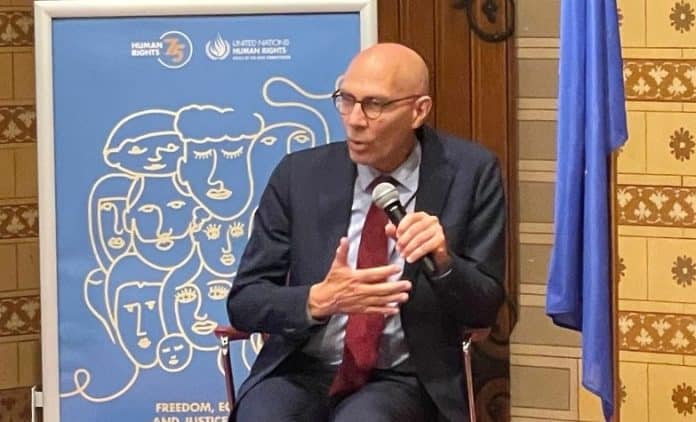“Human rights have evolved through several revolutions in France, the United States, and Haiti. The world has gone through two World Wars, a terrible depression, genocide, the Holocaust, and then in 1948 we adopted the Universal Declaration of Human Rights, the world’s most translated text.”
The United Nations High Commissioner for Human Rights, Volker Türk, made his inaugural official visit to Brussels marking the 75th anniversary of the Universal Declaration of Human Rights. During a Q&A session at the Brussels City Hall on 19 July, he deliberated on various issues pertaining to Europe, notably inflation and migration.
The High Commissioner underscored that the price surges witnessed across the continent since 2021 could potentially be more devastating elsewhere. “The most vulnerable in the Global South have faced inflation and a lack of tourism for two years during the pandemic, often without knowing how to make ends meet. The international financial system has not adequately responded to their needs. This is a major lesson from the COVID-19 pandemic: we must protect economic and social rights and show more solidarity.”
‘Reinstating Rationality’ in Migration Discourse
Regarding migration, Türk revisited the 2015 crisis, characterized by a massive influx of Syrians and Afghans into Europe, alongside Europe’s recent accommodation of 4 million Ukrainian refugees. He provided context by highlighting that at the end of the Second World War, 60 million people in Europe were either displaced or refugees.
“In political narratives, the subject has become polarized and binary. The overarching aspects of solidarity and human rights need to be factored in,” Türk stated. He also noted Europe’s ageing demographic.
“Most of the nursing staff in my parents’ hospital in Germany are immigrants. Most individuals working in elder care are immigrants, and their numbers are insufficient, in this and other sectors. In Europe, we need to reinstate rationality: we have to recognize demographics for what they are and understand it’s in our interest to engage in discussions about migration, accepting that we can’t ensure our survival without it.”
Human Rights-Informed Information Management
Türk asserted that the phenomenon of extremism warrants an in-depth analysis. “It’s connected to fear, the incapacity to navigate the complexity of the world, and the reality that social networks nowadays prompt individuals to identify with specific groups. The continuous inflow of misinformation, as demonstrated by the COVID-19 pandemic, is also a significant risk.”
In the face of artificial intelligence, Türk stressed that lessons must be drawn from managing social networks, where human rights concerns and platform misuse were addressed belatedly, and in his words, “almost too late”.
Timely Decisions Essential to Address Climate Change
Highlighting future challenges, the High Commissioner emphasized the pressing urgency of climate change. “It’s about translating human rights into policies. The objective is to translate human rights into policy. We must also learn from history, given that the fossil fuels industry, for decades, has been throwing dust in our eyes, by telling us that climate change is not what it is, lobbying massively for denial policy, so that politics would actually not do the right thing much earlier on”.
In his responses to public queries on topics like the rights of the disabled and systemic racism and discrimination, the High Commissioner spotlighted a commonly overlooked facet of human rights – the economy. “It’s high time we assess how the economy serves people, not just profits. This is a pivotal aspect of the discourse on discrimination and the origin of inequalities.”
Over his two-day visit to Belgium, the High Commissioner also engaged with European and Belgian authorities.

